Ultra-Indie Spotlight Sundays – Dread Delusion

Greetings, gorgeous ghouls and gangrenous gamers! Welcome to another edition of Ultra-Indie Spotlight Sundays. This week, we’ll be diving into another title from the Haunted PS1 Demo Disk 2020… kind of. Unlike last week’s Filthbreed, the demo for Dread Delusion was actually timed. I needed to go to the creator’s Patreon to get the full experience. Which I did. I ponied up the whole $2 for all you lovely people. Never say I’m not 100% dedicated to my craft. Was it worth it? Let’s find out!
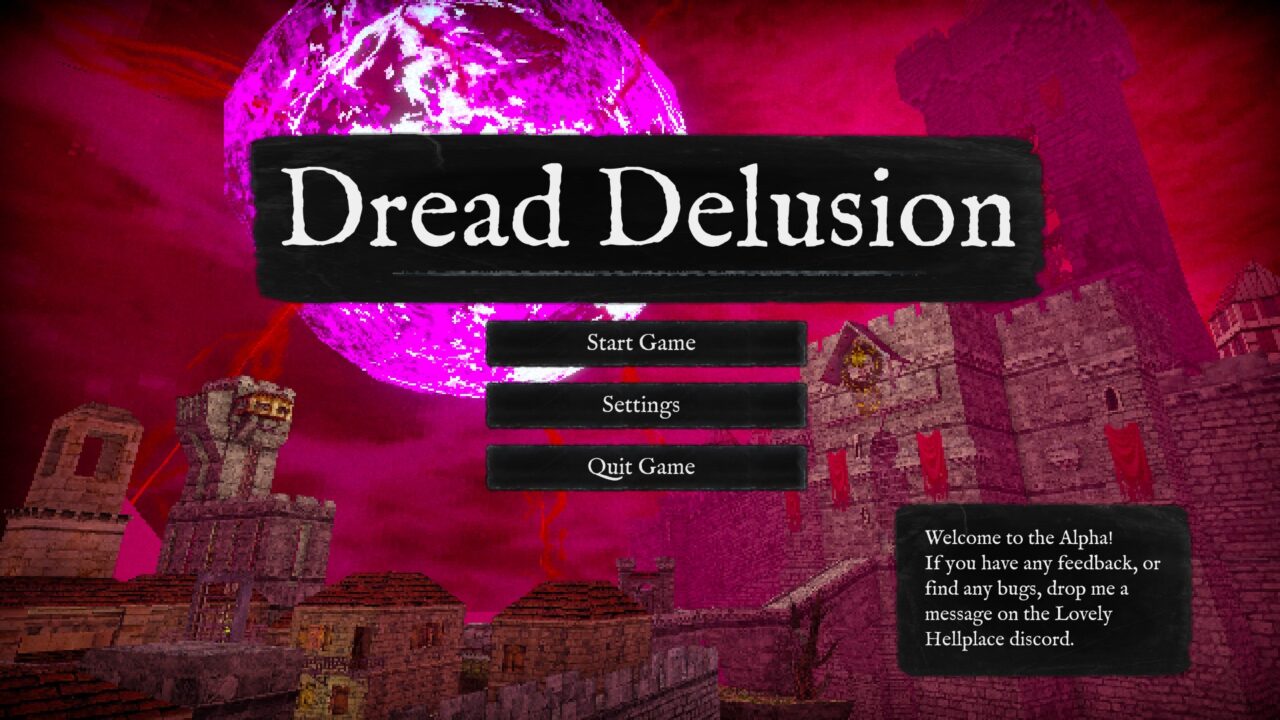
Conceptual Meta-Wank:
I want you to start this article by asking yourself, “At what point am I comfortable contributing to a crowdfunded project?” With the creation of services like Patreon, Indiegogo, Kickstarter, and Early Access, there’s never been more opportunity for average folk to lend their financial support to projects they love. This has also created an interesting dilemma for creators, who must contemplate at what stage it’s best to unveil their project to potential investors. The way it used to work was that only the companies/individuals with a lot of wealth could contribute to funding a project. Creators would pitch games to these large entities, and tailor their pitch to appeal to them. With the “democratization” of the funding process, the equation has shifted. It’s not enough to come to a large company with your pitch deck and previous works. Now, you better have a semi-functional demo/prototype if you hope to get anywhere. Something that gamers can get their hands on and see themselves playing down the road, not as something that might be marketable.
As a result, early crowdfunding games are more and more resembling final products. The Coma 2: Viscious Sisters was only on Early Access for a few months before its full release. This is the byproduct of so many hyped titles either failing to meet fan expectations or never finishing at all. We all have that game that we backed 5+ years ago that never came together. I’ve read so many posts promising “more details soon,” and then months to years of silence. Personally, I almost never contribute to a Kickstarter/Indiegogo. I’m much more likely to support a Patreon, where an existing body of work exists to prove they can deliver. Even then, I tend to only support projects that are close to being finished or are ongoing like a podcast. Or Total War mods…
I’m starting this week’s Ultra-Indie Spotlight this way to emphasize why Dread Delusion is such an odd find for me. It’s the exact opposite of the type of project I’d usually support. It’s barely in Alpha, and with only 81 current backers on Patreon, it’s hardly exploding in popularity. So why did I break my trend and give Dread Delusion my hard-earned two dollars? Without spoiling anything, Dread Delusion relit that spark. It rekindled that flame inside me that hopes that an indie project might rise up into something truly spectacular.
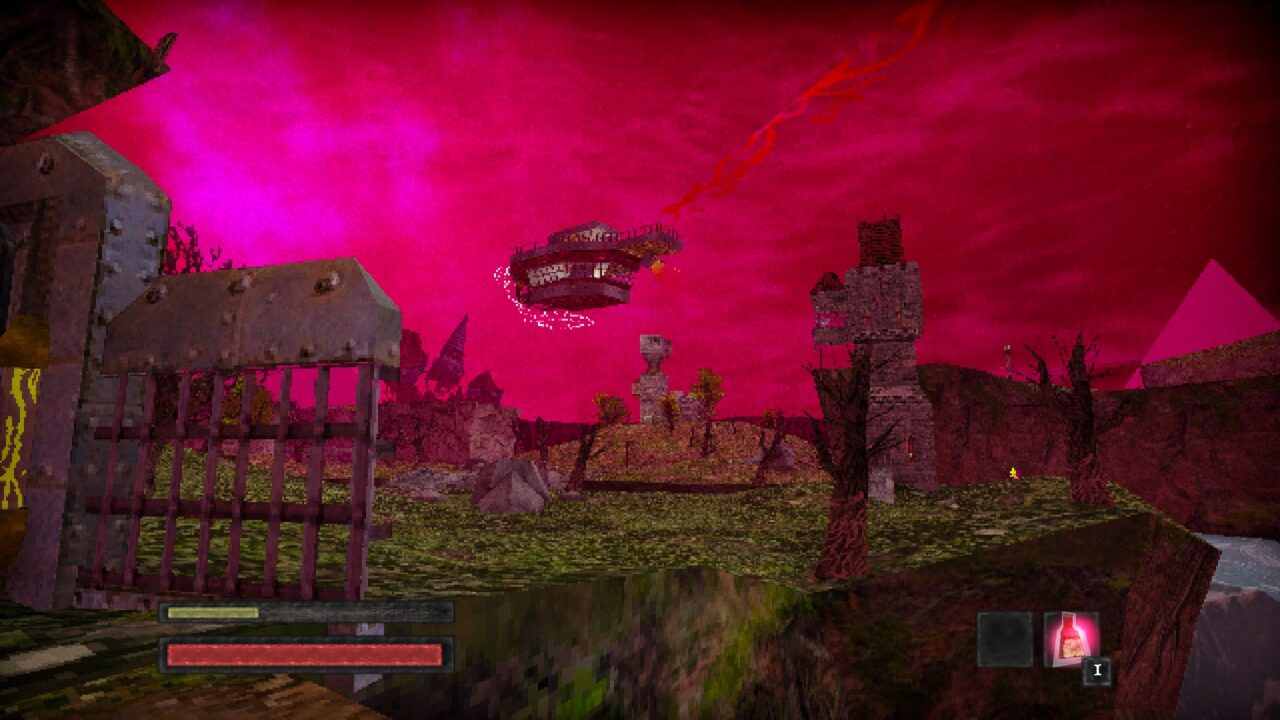
Non-Wanky Game Recap:
Oh goodie, I get to talk about a game that isn’t a Dark Souls clone! Instead, Dread Delusion is a clone of an entirely different FromSoftware game: King’s Field. Go ahead and pat yourself on the back if you’re one of the 4 other people on the planet that actually played that game, and don’t just remember the name as a way to out-nerd other Dark Souls nerds in debates. For the rest of the human race, it’s a single-player first-person RPG with a heavy emphasis on story, exploration, and running out of stamina. Gameplay mostly involves hunting for keys while you try to suss out secrets. Sometimes, you’ll also hit things with a sword. Combat is clunky, but that’s the point. You aren’t a lone Shinobi fighting mythical bad guys to save your lord. You’re just some guy dropped into a terrible world and given an impossible task.
With the limited gameplay, all of Dread Delusion‘s appeal comes from the story and setting. You play as a poor commoner, an inhabitant of the Sacred City and subject of the Clockwork God. A collection of whirring gears and skulls, the Clockwork God has calculated that one will arise that will solve the corruption that is destroying the land and turning people into floating red skeletons. CG doesn’t know who this chosen one is, but knows they’re out there somewhere. So CG is just throwing bodies at the problem until one sticks. You start the game in CG’s chamber, pick your class (warrior or nerd), and are sent on your merry way without even a stick to aid you. From there, you’ll do the aforementioned exploring, discovering, and running out of breath. By the end, you even get to twat people with a sword.
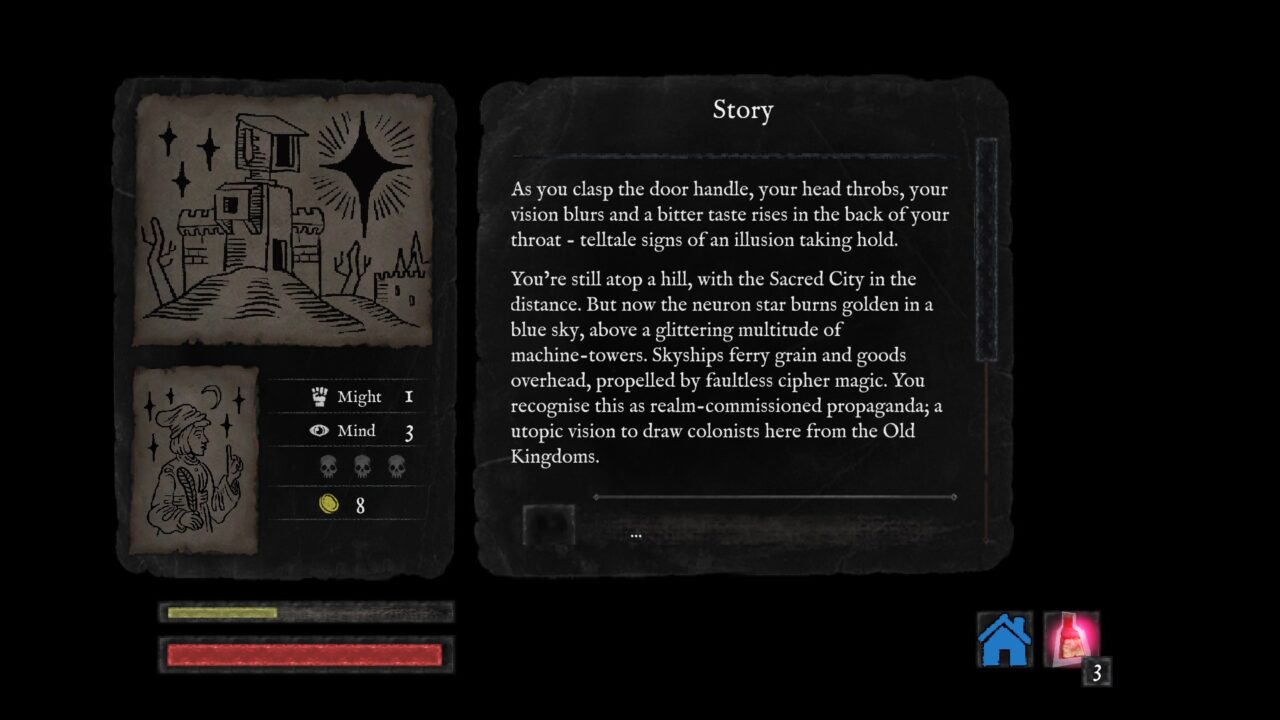
What Works:
This might be the most beautiful retro-style game I’ve ever played. Everything about Dread Delusion is undeniably gorgeous. There’s a rich level of detail you don’t expect from any indie project, let alone one that looks like it was constructed out of a daycare’s spare Legos. Looking at any specific texture is nothing special, but it all blends together gorgeously. The sky is crimson, bathed in the light of a pulsating orb that shoots energy in all directions. The Sacred City towers in the background. A single road leads to a town, almost entirely abandoned and littered with discarded refuse. The lonely roads only inhabitants are the mysterious floating skeletons, who ignore you and can be heard whispering if you get very close. The world seems to be built into a graveyard, as headstones and caskets litter the environment. And yet, even amongst all this death and emptiness, a giant magical airship still patrols the skies. In the distance, a tower with what seems to be a moving head beckons you.
As you dive deeper into the lore, the flavor of Dread Delusion is magnificent. Utilizing a type of magic called Ciphers, the people of this land built the Clockwork God to bring order to the world. Cipher magic can bend the laws of reality, rewriting them into new ones. The land can shift, cities can be built in a year, and even people can be reprogrammed. While you only get glimpses of the whole picture, what you can see is truly unique and fascinating. By the end of the short Alpha, you’ll undoubtedly want more.
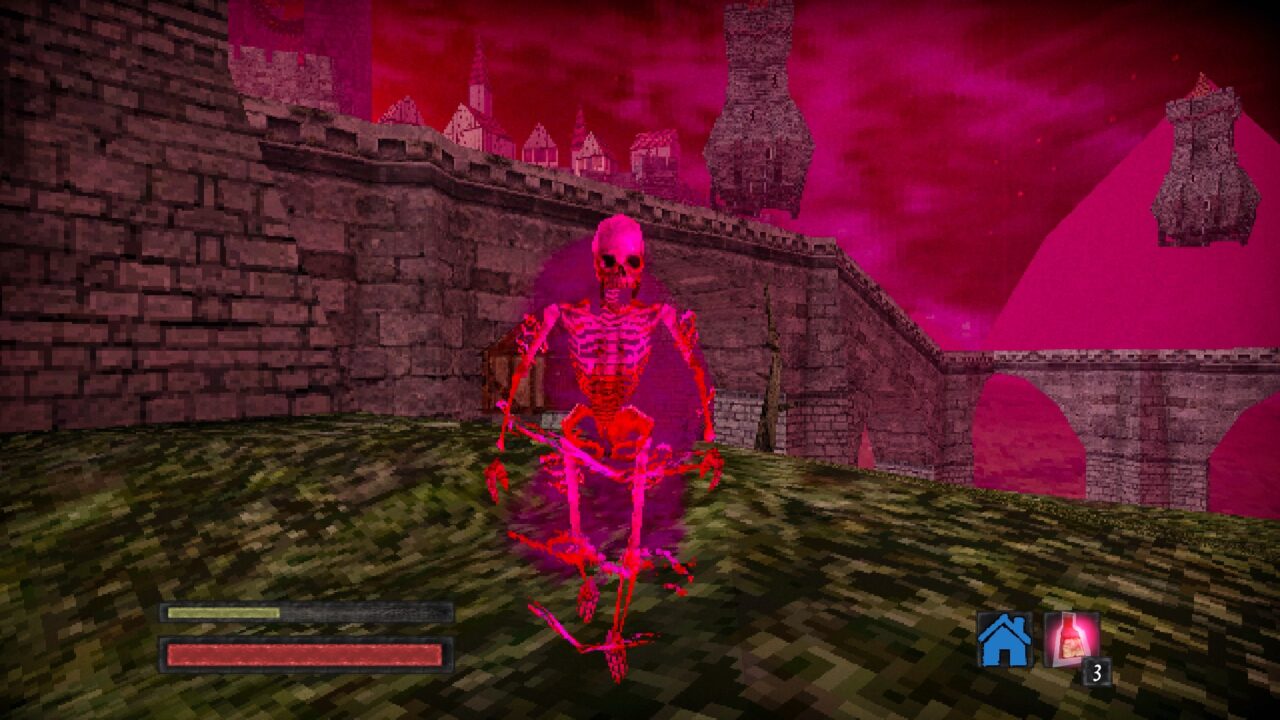
What Doesn’t Work:
This is the point where that whole “Alpha” status comes in. The game is currently in its 0.1 form. There is a ton of work left for Dread Delusion to reach anything close to a final state. As of now, the demo just kind of unceremoniously peters out. You get your sword, smack some skeletons, reach the Sacred City, and can buy some items off of bandits. Go too far in any direction, and you’ll meet a ghost telling you the area isn’t finished yet. It doesn’t even end. You just get to the point where there’s nothing left to do.
Obviously, it would be stupid for me to rag on a game in Alpha 0.1 for being unfinished. It’s just that with so many of the mechanics being unfinished, it’s hard to even criticize them. The current combat system is weak, consisting only of blocks and swipes. Blocking is pointless, as you still take health damage. You might as well just swing until the enemy is dead. Still, this is likely just a placeholder system. A bigger issue is progression. It doesn’t seem that there are experience points in the game, and you level up your stats by finding “delusions” that will either increase your strength or wit. I put all my points into wit, and later found I couldn’t bash open a door. Most RPGs would let you grind/respec to gain the necessary stats, but you can’t in Dread Delusion. As with the combat, this will likely be ironed out/replaced in the future.
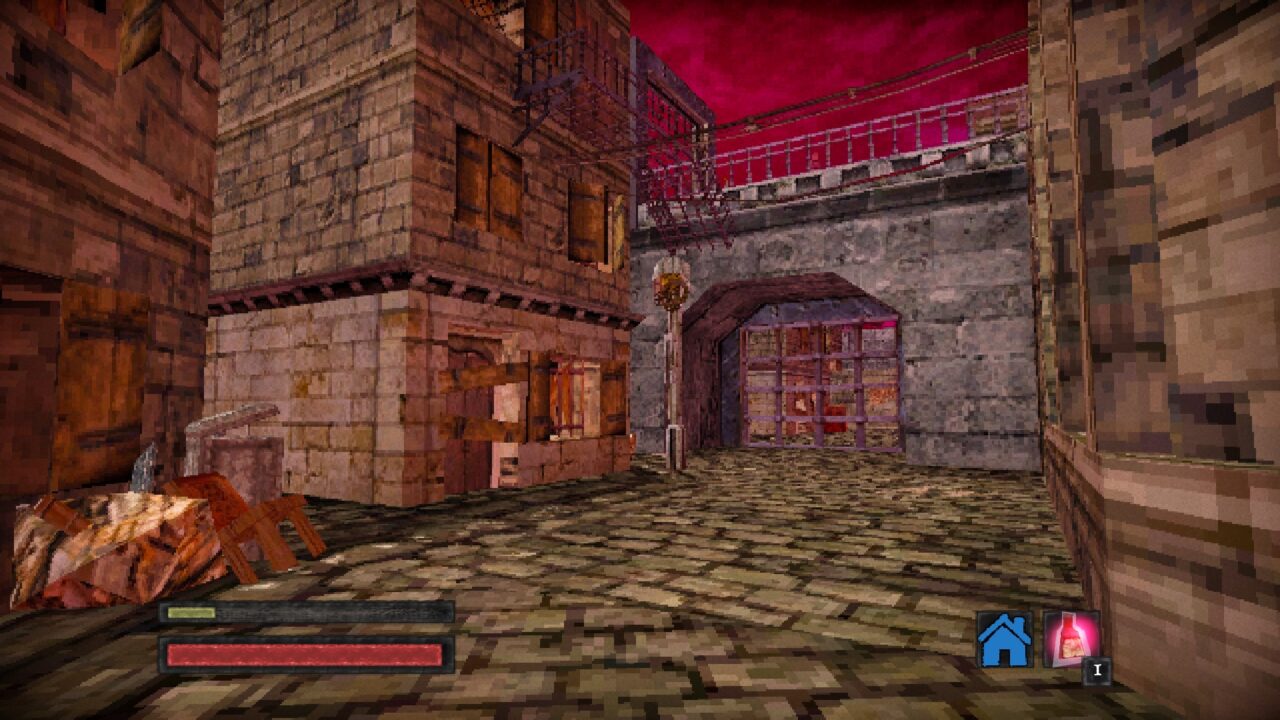
How to Fix it:
As the answer to this is obviously, “make more of the game,” I’m instead going to talk about what I’d like to see added. The clear draw of the game is the story and world. I’d like to see that fleshed out in each zone before a new zone is introduced. Build the characters, the environments, the flavor, then pack it with secrets. Make sure each zone is mostly finished before introducing a new one. The worst part of Early Access games is having to replay through previous content to see a handful of changes. Even if you release each zone in chunks (the current area had a large gated off section), make sure each chunk is finished before opening it. It might be months between updates, so make sure you don’t have to remember exactly what you were doing to explore the new areas.
Finishing the combat is of secondary importance. The game will feel shitty if it’s all just the same skeleton monsters, but don’t worry too much about having a ton of weapons or moves. The sword doesn’t need to do more than swing or block, as long as the focus is on this slower style of combat. Be careful when making new weapons and spells to not make them too strong, as the character’s weakness adds to the overall sense of being just a small part of a far larger oppressive world.

Wanky Musings:
I have no real idea if Dread Delusion will follow the route of so many other promising new indie projects and just fizzle out. I love what I see, but hope alone isn’t enough to keep the game alive. It’s being created by James Wragg, who has worked on a few smaller indie projects before. The game also isn’t shooting for a 50-hour runtime. It describes itself as a “small scale RPG.” So with the smaller scope and creator’s history, chances are there’s a real future for Dread Delusion. Ultimately though, I didn’t roll the dice off of what could be. I gave him my $2 a month because of what Dread Delusion is. Chances are, you’ll find it worth the $2 as well.
If you want to check out the Dread Delusion demo, you can find it here on itch.io. If you want to play the Alpha and support James’ ongoing efforts, you can head over to the Lovely Hellplace Patreon.
Categorized:Editorials Ultra-Indie Spotlight

